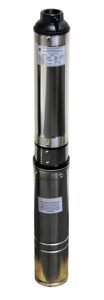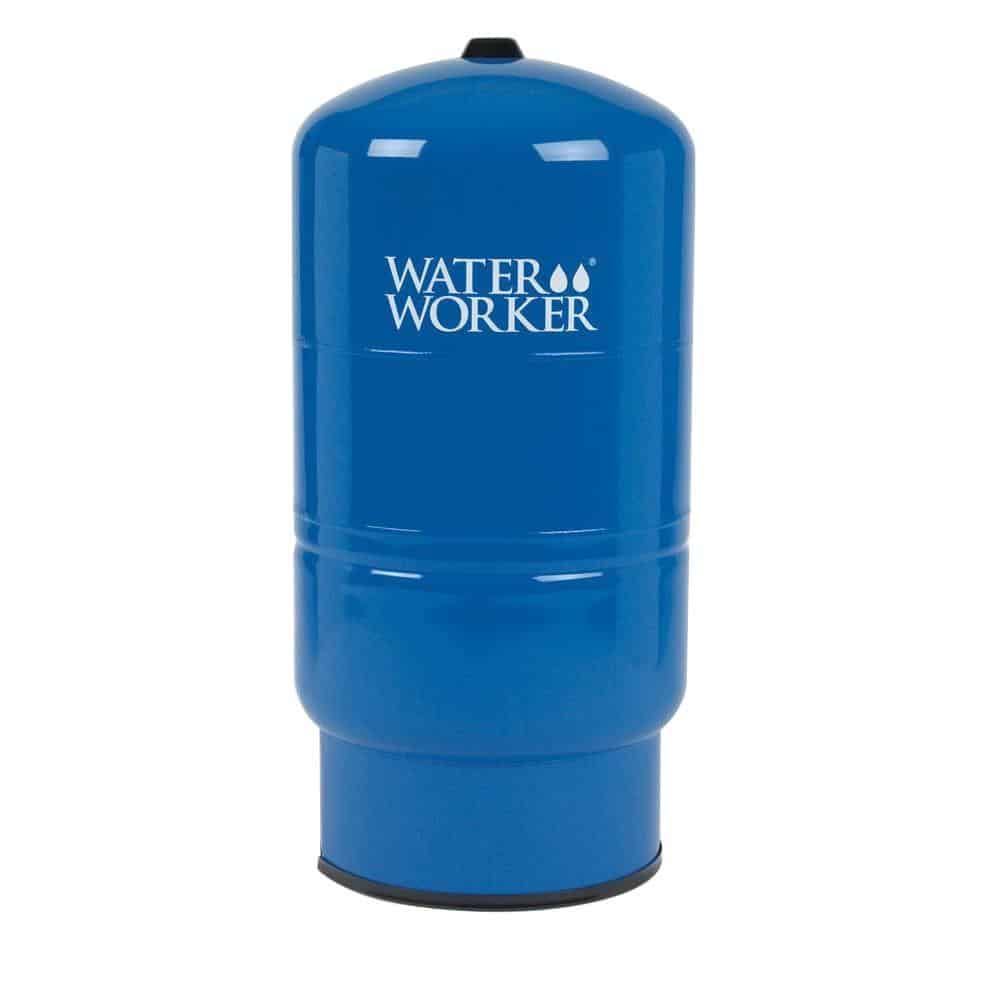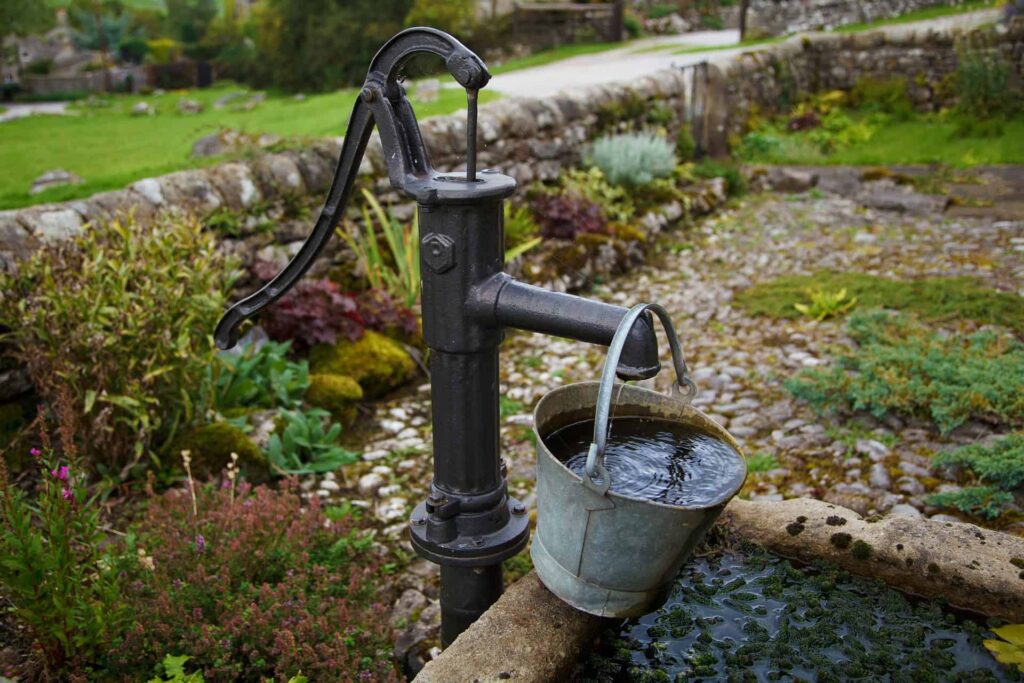How To Build An Off Grid Water Filter System
When it comes to living off the grid, having an abundant supply of clean, drinking water is a top priority.
For people living on the grid, quenching their thirst or taking a refreshing shower is as unproblematic as turning on a tap.
But if yous're thinking about trying out an off-grid lifestyle, sourcing and using water becomes a much more involved procedure.
In this commodity, we go over what that involved process looks like to help people looking to live off the grid, similar yourself, figure out how best to discover, store, and use h2o.
Tabular array Of Contents
- 1 Where to Find Water Off The Filigree
- one.1 Well H2o
- ane.two Springs
- 1.three Rain H2o
- 1.4 Natural Rivers, Streams, and Ponds
- 1.5 Buying and Storing Water
- ii Off-Grid Running Water
- 3 Off-Filigree Water Capture and Utilize
- 3.one Manual Well Pumps
- 3.two Solar/Electric Well Pumps
- 3.3 Cisterns
- iii.4 Rain Catchment Systems
- iv Off Filigree Water Filtration and Treatment
- 5 Choose the Best Water System for Your Needs
Sponsored Links Where to Find H2o Off The Grid
There are more sources of water off the grid than many people realize. Wells are the most obvious answer, only there are several other ways to source water sustainably.
Well Water
Wells are by far the well-nigh mutual source of off-grid water. People take been using well water since the dawn of culture and with good reason. Artesian wells provide a abiding source of freshwater.
The biggest downside to wells is their cost. The average well in the U.Due south. runs about $five,500 and is around 150 feet deep. As the depth of your well increases, so does your cost. The good news is one time you lot complete your well, information technology provides a source of h2o with very piddling required maintenance.
The water table determines the depth of your well in your area. In wetter areas, the water table may be as shallow as 100 feet below the surface. In desert climates and other arid lands, yous may have to go as deep every bit one,000 feet.
If you're seriously considering using a water well on your belongings – and you don't know where to start – our comprehensive piece on everything you need to know most wells and well water is a great place to start.

Getting the water out of your well requires a pump. You can go former schoolhouse with a transmission water pump or choose 1 of the excellent solar powered or traditional electric h2o pumps.
If you lot are looking to purchase a high-quality and affordable h2o pump, bank check out our buying guide that goes over the top 5 water pumps on the market in 2020.

One last consideration is seismic and drilling activeness near you. A skilful-sized earthquake can destroy your well shaft, as tin can activities such equally hydraulic fracking.
Consider the price vs. lifespan benefits when deciding if a well is for yous.

Springs
I of the all-time ways to get water is through a natural spring. An easy fashion to retrieve of springs is as natural wells. They're points where groundwater moves through cracks and fissures in the Earth up to the surface.
Springs toll you nothing and can provide a lot of water depending on their size. It's easy to tap into this h2o with just a few pipes and a manner to divert the water into storage.
Here'south a bang-up explanation of the necessary steps:
The biggest downside to natural springs is their rarity. Most plots of off-grid state you observe won't take a spring flowing on them. Those that do will exist noticeably more expensive than their neighbors.
Springs are also susceptible to environmental factors. If yous have an uncommonly hot or dry twelvemonth, many springs volition cease flowing until weather condition amend.
Rain Water
1 potential source for finding water off-grid is rainfall. It's gratis and easy to collect water if you lot live in a climate with adequate wet. Fifty-fifty better, rainwater can exist i of the cleanest, naturally occurring sources y'all'll notice.
A uncomplicated rain catchment system can divert water from your roof to a storage system. Figuring out how much you can capture over a yr is equally like shooting fish in a barrel.
Every square foot of roof space captures .623 gallons of h2o for an inch of rainfall. Effigy out the square footage of your roof and look up your local rainfall statistics.
Even a tiny home with simply 200 square anxiety of roof space will provide you with most 125 gallons of freshwater per inch of rainfall.
Natural Rivers, Streams, and Ponds
People have been using naturally flowing water pretty much forever. Many prospective off-grid dwellers wonder why they can't simply utilise water plant in natural springs, streams, ponds, and rivers on their belongings.
Unfortunately, there are several fantabulous arguments confronting relying on this source of h2o. First and foremost, information technology's illegal in much of the United states and the balance of the world.
Western states rely on something called Appropriative Water Rights to determine who can use the naturally present h2o.
Without going into the legalistic details, most belongings owners out west don't own the rights to water nowadays on their land. If you draw water from a river or other naturally occurring source, you can be fined.
Realistically it's unlikely you'd exist caught or punished for drawing out a few hundred gallons per yr. However, I don't recommend yous break the police to go your h2o.
Ownership and Storing Water
While not necessarily in the spirit of off-filigree life, it is possible to purchase water and bring it dorsum to your home. The most common way to do this is with a water tank that you load into your car or tow behind it.
The advantages are that you lot only purchase the h2o you need and tin can get more whenever needed. The disadvantages are obvious.
Buying water and driving it to your homestead makes you more susceptible to problems with the grid itself. Information technology tin besides be kind of a hassle, especially if you lot don't already brand a regular trip into town for other supplies.
Bulk water isn't available for buy everywhere, though most RV parks and other areas with frequent travelers will have some options available.
Additional related manufactures:


Off-Grid Running Water
Two main systems allow running water while off-grid. The starting time, gravity-fed storage, has been used for millennia and relies on the strength of gravity to button water through your pipes.
So long as your water tank is at a college elevation than your habitation, the water will naturally motion through your pipes. Municipal water towers rely on this same organisation to provide water force per unit area to filigree-tied homes.
The benefits of this arrangement are apparent, simply at that place are some downsides. First, you lot have to get the water to that summit. If you lot have a rain catchment system or a well-located above your abode, this tin happen naturally. Otherwise, you're going to have to pump water into a storage tank mechanically.
The other method for setting upwards running water is a powered pump. Solar electric well pumps (I highly recommend the Shurflo 288) are more than than capable of providing pressurized h2o to an off-grid habitation. You can get pumps with any gallon per minute flow charge per unit that you demand. They let you lot experience loftier h2o force per unit area only do require a constant draw of power.
The pumps themselves aren't what provide continuous water pressure. Most often a pressurized h2o tank is used. They utilise compressed air storage generated every bit the tank fills. When the pressure drops every bit yous use water, the well pump kicks in and re-pressurizes the system.

Continue reading to learn more nearly well pumps and cistern water storage.
Off-Grid Water Capture and Use
There are several unlike means to capture and store water for your off-grid home. These modify depending on the source of your water.
Manual Well Pumps
One of the oldest systems used for off-grid water is manual well pumps. If you've e'er watched an old Western moving picture, you no doubt think the rhythmic sounds a metal well pump made while drawing water up from hundreds of feet.
These are great examples of old engineering that'southward notwithstanding useful today. Manual well pumps are inexpensive and effective at drawing up h2o from shallow wells.
Notwithstanding, the downsides mostly outweigh the benefits. Manual well pumps have a hard limit on how deep they can depict h2o. For most, this is around 75 m/250 ft. Past that point, it becomes impossible for human ability alone to draw water.
They also don't provide pressurized water the way an electric pump does. You have to pour the h2o you lot draw upwards into a gravity-fed system or some other cistern then add in an electrical pump. This makes it a lot harder to have running h2o.
If y'all want to alive a back-to-nature lifestyle off-grid, they can exist a very viable pick. For nigh, though, electric pumps are a improve selection.

Solar/Electric Well Pumps
The newest electrical well pumps can provide substantial water flow from even the deepest wells. They accept meager ability requirements and are plenty strong plenty to offer either traditional h2o pressure or supply a gravity-fed cistern system.
Choosing the best well pump for your needs comes down to three essential factors:
- The diameter of your well shaft
- The flow rate of water (measured in gallons per infinitesimal/GPM)
- The power requirements
The most basic requirement for a well pump is fitting in your well shaft. It doesn't matter how not bad a pump is if information technology fundamentally won't work for you.
The next stride is figuring out how much capacity y'all need. Well pumps tin can provide all the flow rate you need. Figure out how many fixtures you lot have in your home and how much water pressure you need for each of them.
That determines the gallons per infinitesimal your well pump has to handle.
The concluding consideration is the power draw. Find out how much power a well pump requires to meet if your electric current system tin handle it. Off-filigree solar is getting cheaper and better every single year. Information technology shouldn't be too expensive to add more chapters to your solar organization to power a well.
Hither's a great video that runs through the basics of sizing and installing a water pump on your well:
Cisterns
Depending on the source of your water supply, it may be necessary to store large amounts of water. Rainwater and spring water are the two sources most probable to need a cistern.
Traditionally cisterns were a grade of covered underground water storage. They captured rainwater and held information technology for use during dry times.
Nowadays, cisterns refer to pretty much whatsoever water storage tank, whether higher up basis or below. The most mutual cisterns used for off-grid living are large plastic tanks, but you also see ones made from metal, cement, or even stone.
I recommend plastic storage tanks for most off-grid applications. They're affordable, highly durable, and resist microbial growth better than natural materials. They're besides a lot lighter and more comfortable to movement when empty.
If you use a pelting catchment system, you need a comprehensive storage program in place. A cistern makes information technology easy to store rainwater for the long term.
If you sight your cistern well it can even help provide water pressure through the strength of gravity.
Rain Catchment Systems
Rain catchment systems let yous to collect rainwater as it falls passively. Most apply their roof as the chief collecting signal and funnel water from their gutters and bleed pipes downwards into plastic rainwater storage barrels.
A rain catchment system is the cheapest and easiest off-filigree water system to ready up, only it does accept some downsides. Only certain kinds of roofs are suitable for rainwater catchment. Metal roofs are the best, while tile and slate are adequate. You should never beverage water collected from an asphalt roof.
It can be used for watering your garden but contains too many potential contaminants from the roof material for drinking.
Once you've captured the water, yous need to effigy out how to utilise it. Some rainwater catchment systems collect the water in raised tanks. These are great for a gravity-fed organisation. It besides makes it like shooting fish in a barrel to add a filtering element between the water storage and your home.
Interested in setting up your ain rainwater harvesting organisation? Bank check out our post, "iii Types Of Rainwater Harvesting Systems To Step Up Your Off Grid Game." It goes through 3 proven systems to help you utilize rainwater efficiently and finer. Check it out.
Advertisements Off Grid H2o Filtration and Treatment
Once you've got a reliable source of h2o, you need to filter or treat information technology. Some sources are cleaner than others, but I always feel it'due south better to exist safe than sad where health and wellness is concerned.
The all-time options for treating water off grid are inline and gravity-fed water filtration systems. Inline filters hook into your plumbing and automatically filter all water entering your home. They're the almost natural water filters to utilize just require more than advanced plumbing noesis and running h2o to piece of work.
The most affordable and most manageable water filters to set upward are gravity filters. They piece of work by pouring water into an opening at the elevation and letting it move its style down through filter elements.

Gravity-fed filters, like the Big Berkey water filter pictured above or the Alexapure water filter, are affordable, piece of cake to maintain, and require cipher plumbing to work.
They're smashing if you desire a workable basic solution to filtering off-grid water without dealing with a lot of actress work.
The exception to the filtration dominion is water intended for irrigation and outdoor utilize. There'southward no reason to filter h2o that you're but going to pour right onto your garden after all.
I wrote a helpful commodity about the dissimilar types of water filtration that dive deep into what you need to consider when choosing a water filter.
Choose the Best Water Organisation for Your Needs
The all-time off-filigree h2o organisation is the one that fits your specific situation. Where you are in the earth and your available budget plays a significant function.
Wells are e'er a good option but can get expensive fast if you have to go deep to hit the h2o table. Likewise, rainwater catchment systems provide a well-nigh free source of water but leave you entirely at the mercy of almanac rainfall.
Spend a little fourth dimension checking weather in your local area to find the perfect solution for your off-grid home.
For future relevant reading, you may find the following reads to be helpful:
- How To Notice The Best Off-Grid Water Pumps
- 6 Must Accept Water Filters If You Live Off-Grid
- Our Comprehensive Modest Wood Stove Review
Similar what you read? We would love a share :)
How To Build An Off Grid Water Filter System,
Source: https://tinylivinglife.com/2021/01/learn-how-to-build-off-grid-water-system/
Posted by: haassobsell.blogspot.com


0 Response to "How To Build An Off Grid Water Filter System"
Post a Comment